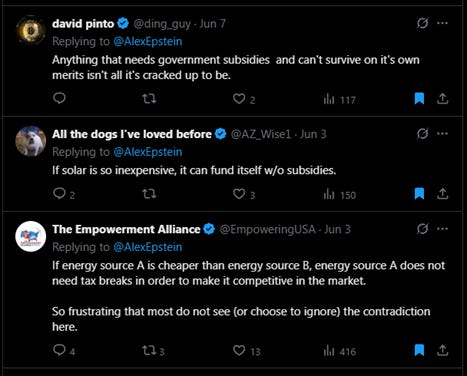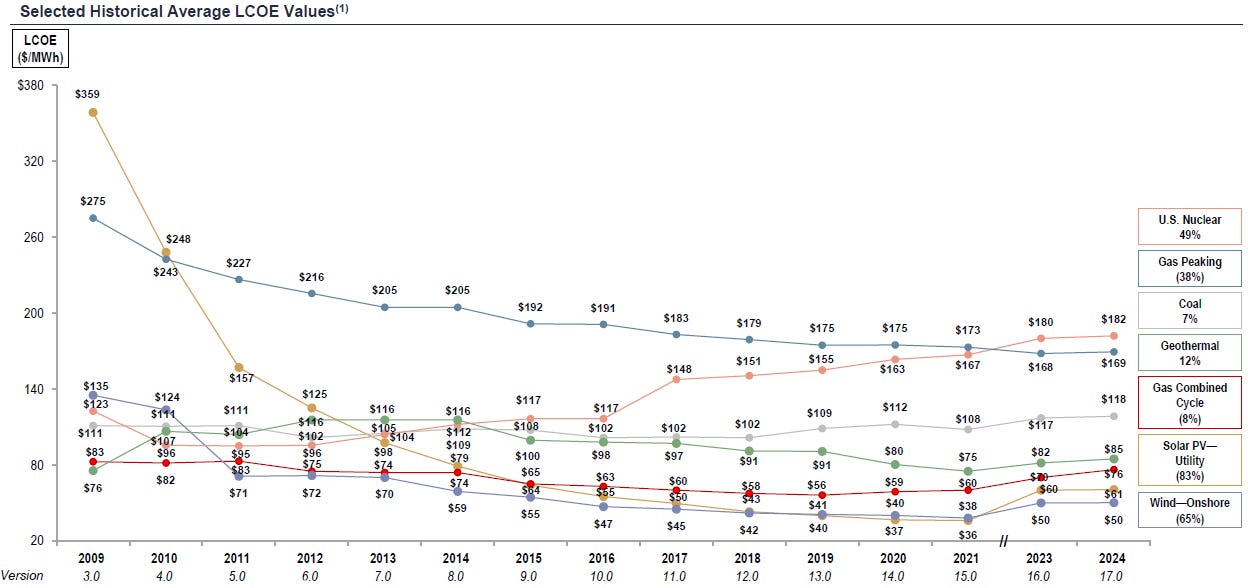Solar's Growing Pains - Part 1: Do We Still Need Subsidies?
What Grid Critics Get Right and Wrong About Solar
For the past few weeks, I’ve seen a lot of discussion about solar. Depending on who you ask, solar is either saving the grid or it’s destabilizing it.
This is an interesting topic because I can see both sides, and it’s particularly relevant with the new House bill putting many renewable subsidies on the chopping block.
Let’s dive right in.
The Core Critiques of Solar
Critics of solar generally have a few main concerns:
1. Subsidies – solar is subsidized despite being the cheapest form of electricity
2. Unreliability – solar is intermittent and destabilizes the grid
3. Expensive – solar is expensive because of a) the large transmission costs to connect solar to the grid and b) the cost to “firm” solar capacity with a companion resource
This will be a 3-part series. In this post, I’ll focus on #1 Subsidies.
The Paradox: Cheap Solar Still Needs Support?
If solar is the least expensive form of electricity, then why does it still need subsidies?
I can feel the frustration within this question.
The renewables camp is quick to always bring up LCOE and how solar’s LCOE is much lower than other power sources (but they make sure to specifically call out coal and natural gas).
On the other hand, they less frequently speak about the subsidies that solar has enjoyed for the past 20 years. Namely, the ITC which immediately refunds 30% to now even as high as 50% of total project costs in the form of a tax credit.
If solar is really so cheap, then it shouldn’t need to be supported by the ITC.
My Take: End the ITC
Solar shouldn’t receive the ITC anymore.
It’s common sense. You subsidize things that are expensive. Solar is no longer expensive.
Solar needed subsidies in the past. Without the ITC, solar would not be as prevalent as it is today. In return for the subsidies, we now have one of the cheapest forms of electricity in history.
Solar does not need subsidies now. Most of the people I know in the renewables space generally agree. They are ok with solar tax credits going away, but also point out that tariffs are distorting the market as well. Solar modules that cost $0.11/W in Europe cost $0.26/W here in the US. A true even playing field would see both the ITC and these solar-specific tariffs removed.
What happens if we remove the ITC?
(This is a rough model, meant as a thought exercise to explain an important tradeoff. There are many out of market factors that affect the math, such as RECs and above-market corporate PPAs. Power markets are not pure microeconomics.)
If the ITC is eliminated and all else remains equal, solar projects would stop getting built.
This might sound contradictory – how can solar not need subsidies, yet stall without them?
Here’s the logic: If the ITC is removed, solar project investors are still going to require the same rate of return. This means that energy prices would need to increase to a level that offsets the loss of the ITC. Let’s say that market prices need to increase roughly 30% to offset the loss of a 30% ITC. The market would be slow to react, but eventually pricing would get there.
Why? Because even without the ITC, solar is still the lowest cost form of electricity. So in order to incentivize new buildout of supply, market prices would need to rise to the level that supports the lowest cost of new-build, which is solar, hence the 30% power price increase.
The Tradeoff: Taxpayer vs Ratepayer
In the end, we’re still paying the costs; they’re just being shifted.
Instead of the taxpayer funding solar tax subsidies, the higher energy costs are being passed down to the ratepayer. This reduces our fiscal deficit, but increases costs disproportionately for those with lower income.
Taxes are progressive. Energy costs are regressive.
I think it’s important to recognize this tradeoff.
A Better Way to Prove Solar’s Maturity
With that being said, I believe this is the right course of action. I think solar critics would be okay with the ITC being removed and market prices rising to support solar new-build because in this scenario they know for sure that solar is competing on its own merits and not winning due to subsidies.
People want to see the proof of solar cost competitiveness and hear acknowledgement that solar’s progress to date was built off of subsidies.
Conclusion: End the Subsidies, Own the Tradeoffs
Criticism towards solar subsidies is valid. Solar should not be subsidized anymore.
By providing subsidies to solar in the past, we got to rapidly scale one of the cheapest and cleanest forms of electricity in history.
By removing these subsidies, we may see a pause in solar development while the market digests these changes. This pause comes during a time of great demand for power. Furthermore, the costs we pay to subsidize solar will still be paid through higher energy prices.
These are the tradeoffs.



